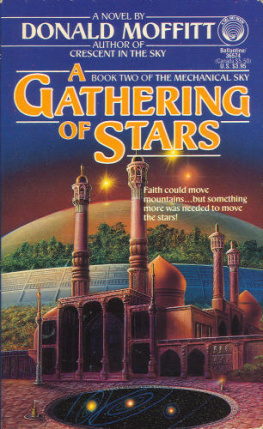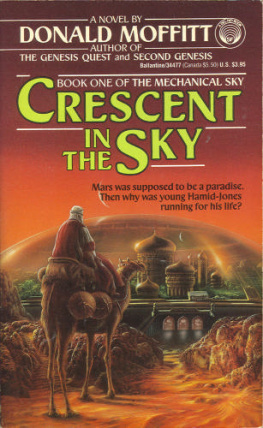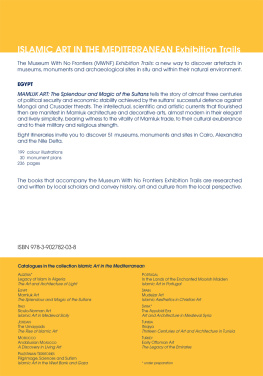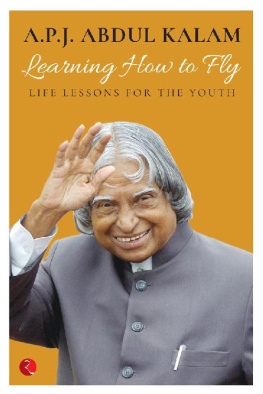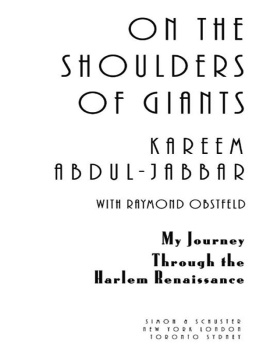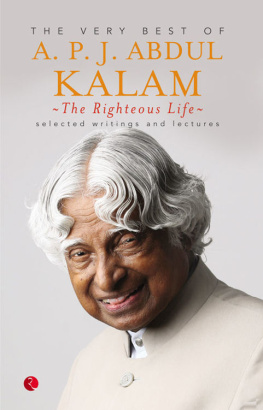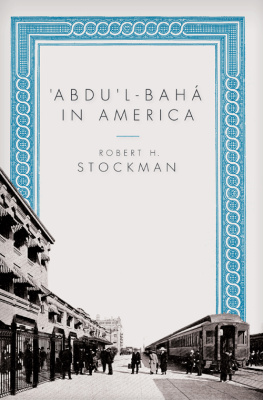A GATHERING OF STARS
Book Two of The Mechanical Sky
Donald Moffitt
Copyright 1989 by Donald Moffitt Library of Congress Catalog Card Number: 89-91891 ISBN 0-34.5-36574-7 Cover Art by Don Dixon e-book ver. 1.0
Grateful acknowledgment is made to Arthur C. Clarke and his agents, Scott Meredith Literary Agency, Inc., 845 3rd Avenue, New York, NY 10022, for permission to reprint an excerpt from "Space the Unconquerable" from PROFILES OF THE FUTURE by Arthur C. Clarke.
"Try to imagine how the War of Independence would have gone if news of Bunker Hill had not arrived in England until Disraeli was Victoria's prime minister and his urgent instructions on how to deal with the situation had reached America during President Eisenhower's second term. Stated in this way, the whole concept of inter-stellar administration or culture is seen to be an absurdity."
arthur c. clarke
CHAPTER
The mullah's knife flashed, and a spurt of arterial blood drenched his white robes. He continued sawing away at the sheep's throat until he was satisfied, then untangled his fin-gers from the woolly head and let it drop limply to the plastic sheet that the spaceport janitorial crew had spread to protect the inlaid floor of the departure lounge.
"Well, you're guaranteed a safe voyage, at any rate," said Hamid-Jones's baby-sitter, an impressively self-possessed young attache from the Centauran embassy. "Are you going to go over there to dip your fingertips for luck?"
"I don't think so," Hamid-Jones said.
Droplets of blood were hanging in the air, settling impercep-tibly in the almost nonexistent gravity of Deimos. A couple of members of the maintenance crew were sweeping the air with large sponges to catch stray drops escaping the tarpaulined area, but one jet of blood had traveled twenty feet, and another cover-alled worker was hurrying to intercept it with a catch basin.
"Wise decision," said the watchdog. "Your ident's as good as we could make it, but it's best to stay in the background as much as possible till you're safely aboard Centauran territory."
The mullah was winding up the sacrificial rites with a prayer. A number of passengers were self-consciously lining up for in-dividual blessings.
"What about the person whose place I took?" Hamid-Jones asked.
"He'll be sent back down to Mars in the same diplomatic pouch that brought you up, and we'll do a lot of computer shuf-fles over the next few months to pass along the hiatus till it's diluted enough to be wiped out. How was the ride? Uncomfort-able?"
"It wasn't too bad."
The "pouch" had, in fact, been a sealed cylinder large enough to stretch out in. An outer shell was filled with an inert gas and lined with a lot of sophisticated baffles, some of which projected false images of the cylinder's interior. An inner suspension con-tained a cocoon that protected the passenger against jolts. There was a miniaturized life-support facility that provided enough oxygen for thirty-six hours, and a rather embarrassing sanitary facility that relied heavily on stickybags that would have to be disposed of later by someone or other. Hamid-Jones had had a few bad moments when the pouch had been dropped or turned upside-down, but once out of Mars's gravity field it ceased to matter. On Deimos, the Centaurans had extracted him without being detected.
Hamid-Jones reflectively fingered the curls of his false beard, which was done up in ribbons and squared off Centauran style. False was not exactly the word, since the whiskers had been force-grown from his own DNA and grafted, hair by hair, to a three-day growth of his own stubble by molecular machines. A coppery dye job disguised the disjunction at the roots, which could be presumed simply to be growing out again and gave him the properly foppish look of a young foreign service officer. He had also sacrificed the fleshy pad of a forefinger in the unlikely event that a DNA sample might be required at exit; he would have a sore finger for a few weeks aboard ship as the graft was rejected and his own fingertip, already seeded for cloned regen-eration, grew out again.
He had balked at losing an eye, even temporarily, and the ambassador had upheld him against the insistence of the intel-ligence wallahs. "A retinal check is extremely unlikely," the ambassador had said. "Mars has adhered to civilized standards for over two centuries. The last time they interfered with dip-lomatic personnel was in the first unsettled years of the usurper, and even then they only checked the identities of new arrivals, not returnees."
"Don't worry," the attache laughed. "You look like a proper Centauran. Your build is a plus; it's fortunate you were born on Earth. The gravity on our capital planet is two and a half times that of Marsabout ninety-five percent of Earth gravity. You won't have any problems adjustingour ships boost and deboost at close to a standard G, so you'll have two years of subjective time to toughen up."
Both of them turned to look at the view outside the huge curving windows of the departure lounge. Lit from one side, Mars was an enormous breast in the sky, with Olympus Mons for a nipple. The view from Phobos, of course, was more spec-tacular; there, Mars filled the skyalmost was the sky. But on Deimos, at least, one had the sensation that one was looking up at it, not in danger of plunging down into it at any moment.
"Here it comes," the attache said. "If you look close, you can just about make it out."
Hamid-Jones strained his eyes and was rewarded by the sight of a glimmering mote at the exact center of the planet. Of course that was the only place it could beat Mars's equator and di-rectly below, or rather "above," the tiny moon. Even the east-west and west-east mail satellites, which dropped their own skyhooks from orbits a little above, or below, synchronous or-bit, were constrained to an equatorial run.
As he watched, the mote grew more bright. It made the 12,000 mile trip up its spider's thread in a couple of hours, and at about a hundred miles the braking rockets had to cut in to keep it from smashing into Deimos. Its flattened nacelle shape was visible now. The last time Hamid-Jones had seen it, it had been un-reeling itself from the Martian sky with a belly full of soldiers.
"It's the last one," the attache said. "Do you want to board ship before the crush?"
"No, I'll wait," said Hamid-Jones. "I want to see if anyone I know gets off."
"Hmm, yes, there's that," the attache agreed. "A starship's big, but it's best to see what inconvenient persons you might have to avoid for the next two years." "Five years," Hamid-Jones corrected.
"Yes, five to us stay-at-homes. But time will fly for you. The time dilation effect won't be very noticeable for most of that initial year of boost, but by the time you get up to within about one millionth of one percent of the speed of light, it'll reach a factor of approximately seven hundred. So you'll do the entire middle part of the journeycovering some three and a quarter light-years of distancein what will seem to you to be about a day and a half. Turnover will take place halfway through that day and a half, and I guarantee that the captain and crew will be very busy. There's no gravity for several hourswhile the ship is coasting through that appalling void at ninety-nine point nine thousand nine hundred ninety-nine percent of the speed of lightand I believe the passengers are confined to their cabins for safety reasons. Actually it's to keep them out of the crew's hair. Then comes deboosting and another year of shipboard boredom."
"You seem to have it all down pat," Hamid-Jones said. He was getting tired of being on a leash, even when the other end of the leash was held by a succession of scrupulously agreeable people like the attache.
"Oh, I've given the tour many times," the attache said. There might have been a tiny shade of resentment in his tone, too. "There'll be a lecture aboard, I believe, for those passengers who are new to star travel."

